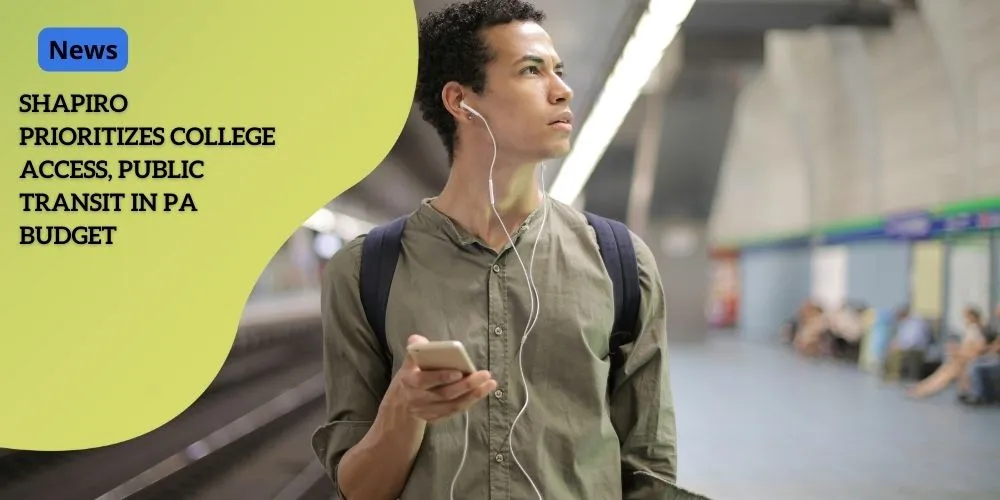Shapiro Prioritizes College Access, Public Transit in PA Budget

Anúncios
Commitment to Sustainable Urban Development
Pennsylvania Governor Josh Shapiro’s budget proposal demonstrates a firm commitment to sustainable urban development.
By supporting public transit, the state aims to reduce the environmental impact and promote eco-friendly commuting options.
Anúncios
This shift towards greener living aligns with global efforts to combat climate change and encourages residents to adopt sustainable transportation habits.
Improving Public Transit Services and Infrastructure
Governor Shapiro’s plan includes substantial investments in public transit services, routes, and infrastructure.
Anúncios
Modernizing transit systems ensures more reliable and efficient services, which can help increase ridership and decrease road congestion.
Improving infrastructure—like updating tracks, stations, and vehicles—enhances the overall user experience and promotes a positive image of public transportation.
Promoting Eco-Friendly Commuting Options
One of the key goals of this budget is to introduce and promote eco-friendly commuting options.
By increasing the availability and convenience of public transit, the plan encourages citizens to reduce their reliance on personal vehicles.
This change can significantly lower the state’s carbon footprint and lead to healthier urban living conditions.
- Electric Buses: Integrating electric buses into the transit fleet reduces emissions and sets the stage for a cleaner future.
- Bike-Sharing Programs: Expanding bike-sharing options offers a sustainable alternative for short-distance travel.
- Ride-Sharing Integration: Facilitating connections between public transit and ride-sharing services enhances first-mile and last-mile connectivity.
Improved public transit also benefits local businesses by making it easier for customers and employees to reach their destinations.
The efforts towards more accessible and affordable transit options can boost economic activity, contributing to the overall growth and prosperity of Pennsylvania.
“`
Addressing Educational Equity
Funneling Additional Resources to Underfunded Public Schools
Investing in education equity is like planting seeds for the future.
Governor Shapiro recognizes the importance of channeling more resources into underfunded public schools.
By doing so, the aim is to level the playing field and ensure every student has access to quality education, irrespective of their ZIP code.
These additional resources can translate into better facilities, more advanced learning materials, and enhanced support for both students and teachers.
Promoting Equal Educational Opportunities
Promoting equal educational opportunities means giving every student a fair chance to succeed.
This could involve increasing funding for scholarships, providing additional support services, and implementing targeted academic programs to help students who are struggling.
Shapiro’s budget proposes measures to ensure all students, regardless of their background, have access to the same high-quality educational experiences.
Improving Student Outcomes
Improving student outcomes isn’t just about providing more resources; it’s about using them effectively.
The new budget aims to enhance student outcomes by investing in teacher training, optimizing curriculums, and incorporating technology into the learning process.
By focusing on these areas, the goal is to produce graduates who are well-prepared for the challenges of higher education and the workforce.
Narrowing Achievement Gaps
The educational disparities between different demographic groups remain a significant concern.
Narrowing these achievement gaps requires a multi-faceted approach.
This includes targeted funding to the schools that need it the most, as well as specialized programs designed to support underrepresented and disadvantaged students.
By narrowing these gaps, we can foster a more just and inclusive society.
Fostering Social Mobility
Addressing educational equity goes beyond the classroom. It’s about fostering social mobility and creating pathways for students to move up the economic ladder.
By ensuring that all students receive a solid education, we’re giving them the tools they need to pursue higher education, secure better jobs, and contribute positively to society.
Shapiro’s budget proposal reflects a commitment to not just addressing existing inequalities, but to actively eliminating them.
It’s an investment in the future of Pennsylvania, aimed at ensuring that every student has the opportunity to succeed. “`
Revisiting the Private School Voucher Program
Weighing the Pros and Cons of the Voucher Program
The private school voucher program is a hot topic in educational policy.
Proponents argue that it offers parents more control over their children’s education.
By providing vouchers, families can afford private schooling otherwise out of their reach.
This choice can drive competition, potentially spurring improvements across the educational landscape.
On the flip side, critics argue that diverting funds from public schools to vouchers weakens the public education system, which tends to already be underfunded.
Critics also claim that such programs may increase educational inequality by benefiting families who are already relatively advantaged.
Implications for Public Education
The diversion of public funds towards vouchers could mean fewer resources for public schools, potentially impacting the quality of education they can offer.
Public schools are foundational to providing equitable education across communities, particularly in under-resourced areas.
Shifting funds to private institutions might exacerbate existing disparities, leaving the most vulnerable students at a disadvantage.
Balancing School Choice and Fairness
Balancing the benefits of school choice with the need to support public education is a delicate act.
While it’s crucial to recognize parents’ desire for alternatives, directing resources away from public schools is problematic.
Policies could consider hybrid models where school choice is facilitated without significantly draining public school resources.
- Maintaining a baseline of funding for all public schools to ensure no drastic negative impact.
- Implementing strict oversight to ensure that private schools receiving vouchers uphold educational standards.
- Increasing transparency in how voucher funds are utilized to maintain public trust.
In conclusion, while the private school voucher program offers compelling arguments for increased choice and competition, it is essential to consider its wider implications on public education. Striking a balanced approach could foster a more equitable educational environment in Pennsylvania.






